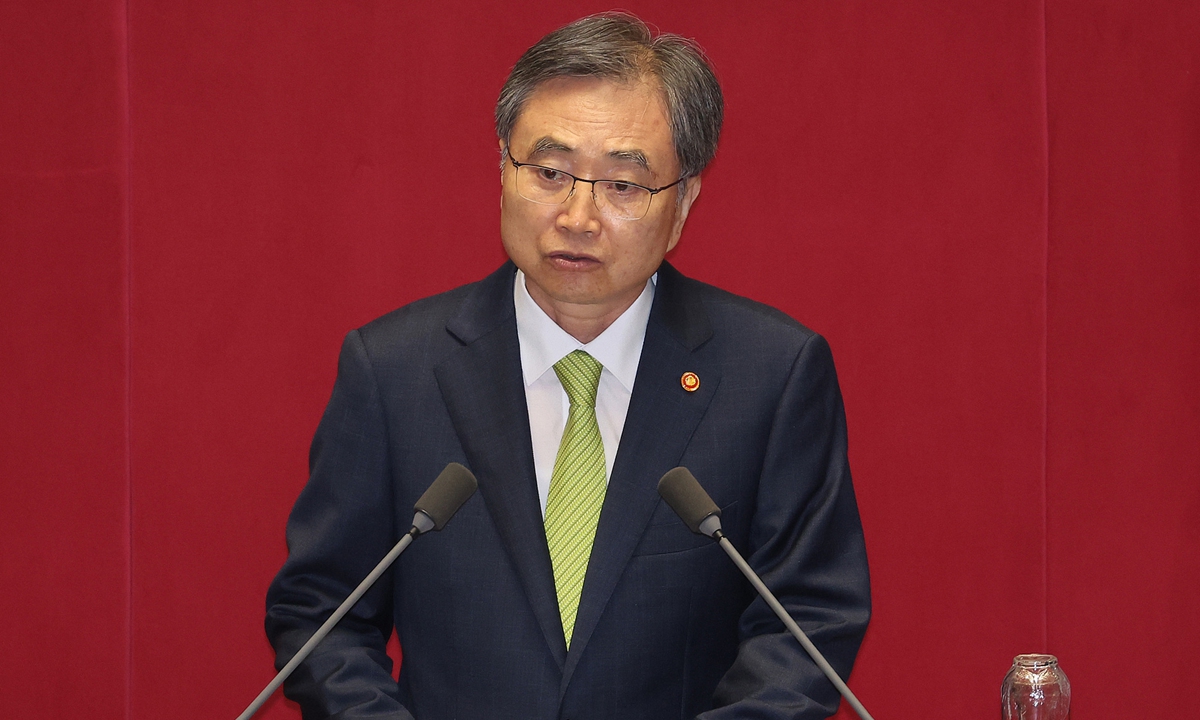在韩外长访华之际,两国关系需要在追求稳定的同时取得进展 - 2025-09-16

South Korean Foreign Minister Cho Hyun delivers a speech at the National Assembly in Seoul on July 23, 2025. Photo: VCG
At the invitation of the Member of the Political Bureau of the Communist Party of China Central Committee and Foreign Minister Wang Yi, Cho Hyun, minister of foreign affairs of the Republic of Korea (ROK), will visit China starting on Wednesday. This will be Cho's first visit to China since taking office, and also the first bilateral foreign ministers' meeting since the inauguration of South Korea's new government. The timing of this visit is special and carries high expectations from various parties. We hope that Cho's visit will create conditions for further improvement and development of China-South Korea relations.
Recently, a series of positive signs have emerged between the two countries. The South Korean government announced that, starting at the end of this month, it will grant visa-free entry to Chinese group tourists. In major shopping centers in Seoul, such as Lotte Duty Free, Chinese-language signs are once again prominently displayed, and staff are carefully preparing to welcome Chinese tourists. This scene recalls the prosperity of the peak years of people-to-people exchanges between the two countries. Even more moving, Lee Jae-suk of the Incheon Coast Guard, who lost his life while rescuing a Chinese national, has been mourned and saluted by both governments and peoples. This further demonstrates that, as neighbors that cannot be moved away, the people of China and South Korea share a natural friendly bond.
The fact that the South Korean foreign minister chose to visit China first, "breaking with convention," reflects Seoul's proactive will to improve and develop relations with Beijing from a political perspective. Recent US pressure on South Korea over tariffs and investment allocation has further made South Korea recognize the importance of diplomatic balance. Observers see Cho's visit as highlighting pragmatic considerations: first, to stabilize China-ROK relations through high-level communication and create a buffer against possible US-ROK trade frictions; second, to release a positive signal and promote bilateral cooperation to bear fruits in new areas; and third, to pave the way for the upcoming Asia-Pacific Economic Cooperation (APEC) Economic Leaders' Meeting.
As an important economic cooperation mechanism in the Asia-Pacific, APEC offers China and South Korea a broad platform to deepen cooperation at the regional and even global levels and to jointly promote prosperity. Confronted with growing unilateralism and protectionism, China and South Korea - both supporters and beneficiaries of free trade and economic globalization - can take this opportunity to jointly advocate an open and inclusive spirit of regional cooperation, safeguard stable and unimpeded industrial and supply chains and oppose protectionism and "decoupling," contributing positive energy to regional economic development.
Since the establishment of diplomatic relations in 1992, China-ROK bilateral ties have achieved leapfrog development. The two countries have formed highly complementary economic structures. China has, for many consecutive years, been South Korea's largest trading partner, largest export market, and top source of imports, while South Korea has also become one of China's most important trading and investment partners. Their shared common interests and solid foundation of cooperation become the "ballast" that stabilizes the fundamentals of the bilateral relations. Despite changes in the international landscape and challenges or disruptions that have at times arisen in bilateral ties, the essence of mutual benefit and win-win cooperation, the objective conditions of geographical proximity and cultural affinity, and the people's aspiration for friendly exchanges have remained unchanged. These constitute the strongest confidence for both sides in navigating uncertainties.
Currently, China-South Korea relations are at a critical juncture of carrying forward the past and ushering in the future. To promote steady, long-term progress and elevate the relationship to new heights, the key lies in implementing the important consensus reached between the two heads of state. Both sides need to view and develop the relationship with a strategic vision and a long-term perspective, upholding the principles of mutual respect and equality for mutual benefit. In particular, joint efforts are required to eliminate external interference.
Given the complex and evolving international situation, external factors in the regional landscape can sometimes act as variables affecting China-South Korea relations. In such circumstances, both sides should maintain their composure, concentrate on the fundamental well-being of their peoples and the overall interests of the region, and avoid being hijacked or led astray by third parties. Independently making decisions in line with their own national interests is the responsibility that China and South Korea should bear as mature and responsible states.
In recent times, an extreme anti-China undercurrent, stirred up by South Korea's far-right forces, has seriously eroded the public foundation of friendship between the two countries. South Korean President Lee Jae-myung recently publicly criticized anti-China rallies, and Seoul police have also imposed legal restrictions on such activities in Myeongdong. We hope the South Korean government will continue to take practical actions to effectively protect the lawful rights and interests of Chinese citizens in South Korea and actively guide the public toward an objective and rational understanding of China. South Korea's mainstream opinion bears an even greater responsibility to educate the public that friendly coexistence and win-win cooperation have been the main theme of the past 33 years since the establishment of bilateral ties, and that China's development is an opportunity, not a threat, to South Korea. Facts and truth should be used to narrow the space for extremist rhetoric.
The South Korean foreign minister's visit is an important opportunity. We look forward to both sides engaging in in-depth communication, enhancing understanding, building mutual trust, focusing on cooperation, and handling differences properly, so as to create a favorable atmosphere for higher-level interactions in the future. China and South Korea are neighbors that cannot be moved away and, more importantly, partners for shared success. We look forward to both sides taking this recent positive interaction as a chance to promote the steady development of bilateral ties.
Source: Global Times
